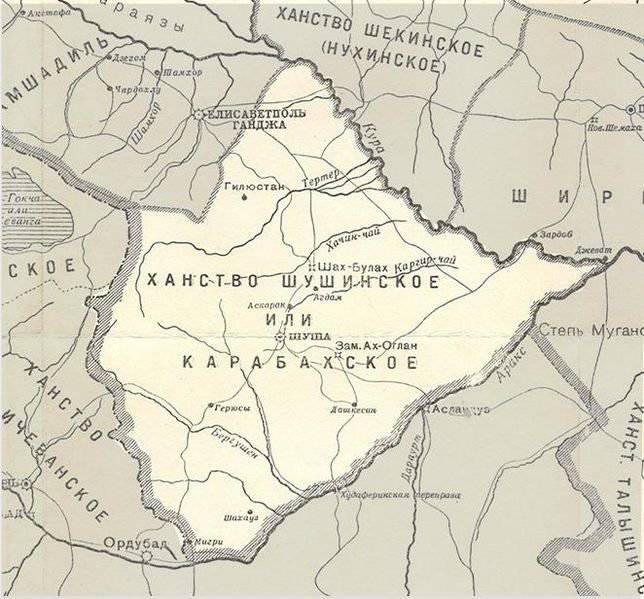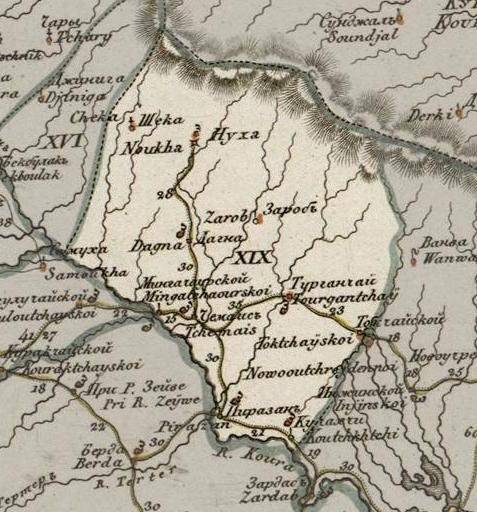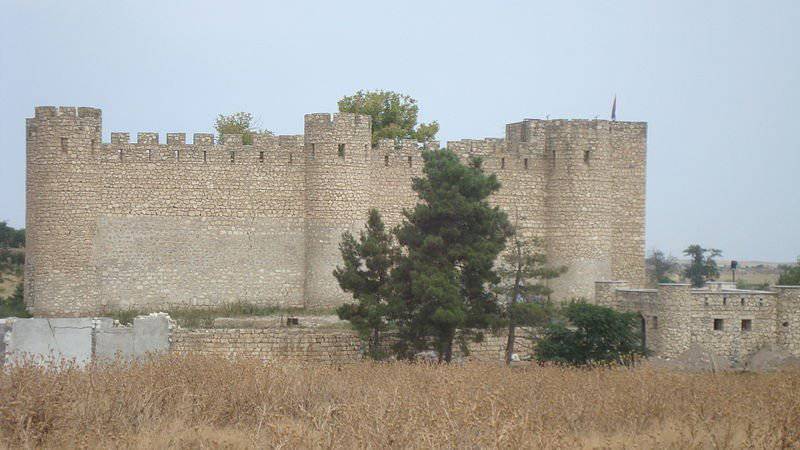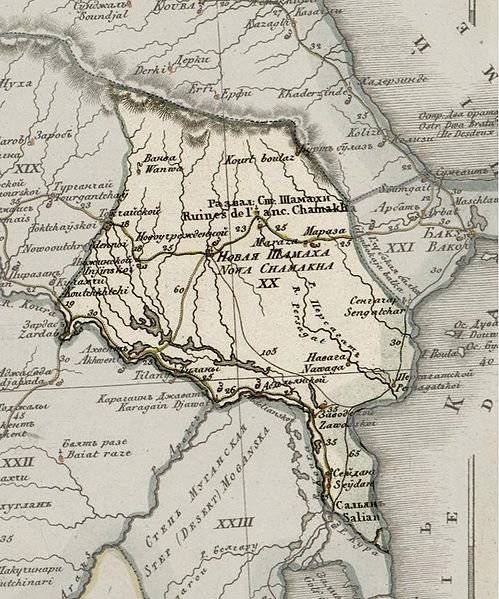Accession of the Karabakh, Sheki and Shirvan khanates. Feat detachment Karyagin
Joining of the Karabakh khanate
After returning from the Erivan campaign, the Caucasian governor began negotiations with the governor of the Karabakh (Karabakh) Khanate, Ibrahim Khan. Ibrahim Khalil Khan tried to rule independently, not submitting to either Iran or the Ottoman Empire, but the foreign policy situation forced him to ask for protection from one of the great powers. The choice was made in favor of the Russian Empire. Back in 1783 — 1784. The Karabakh ruler conducted secret negotiations on the acceptance of his possession into Russian citizenship. In 1795 and 1797 Karabakh suffered devastating invasions of the Persian troops of Aga Mohammed Khan. In 1797-1799 under the threat of absorption by the Persian Empire, he again appealed to St. Petersburg with a request for protection.
As soon as the rumor about negotiations between the ruler of Karabakh and Russia reached Tehran, the Persian ruler Feth Ali Shah, fearing the loss of another possession in the South Caucasus, which he considered his own, sent an army to Karabakh. At the same time, the Persian Shah made generous promises to the ruler of Karabag. But 80-year-old Ibrahim Khan was an experienced man, wise with a long life filled with bloody conflicts, so he did not believe in these promises. Moreover, the Karabakh Khan withdrew his troops and utterly defeated the Persian detachment at Disan.
Tsitsianov congratulated Ibrahim Khan on his victory and hurried to conclude a treaty, because an even stronger Persian army was expected to appear in the spring. In the town of Kurekchay, not far from Ganja, the Kurekchay agreement was signed. The Caucasian governor took the oath of the Karabakh khan for allegiance to the sovereign of Russia. Ibrahim pledged to pay an annual tribute to 8 thousand chervonets. Khan was granted a precious saber, a banner with the Russian coat of arms, promised inviolability of rights and the preservation of his possessions. Subsequently, due to the flight of the last Khan of Karabakh to Persia, the khanate was liquidated. Khan's grandson was taken into honorable hostages with permanent residence in Tiflis, he was given a permanent annual content in 10 thousand rubles. Ibrahim Khan himself was killed by soldiers led by Lieutenant Colonel Lisanevich in 1806 year. According to one version, the Karabakh ruler decided to surrender the Russian garrison to the Persians (in Eastern politics, such matters were common) and Lisanevich prevented betrayal. According to another version, this murder had no political motives.
An important military and strategic consequence of this agreement was the deployment of the Russian garrison in Shusha. The powerful and fairly large fortress of Shusha, the capital of the khanate, was located 80 versts from the Persian border on the Araks River. Therefore, this fortress could play the role of a springboard for conducting military actions against Persia proper. In the fortress there was a battalion of Russian troops, which was obliged to contain the ruler of Karabakh.

Accession Sheki Khanate
Another possession that joined Russia was the Sheki khanate. Since the end of the 18th century, in connection with the threat of Persian conquest, the Sheki khans sought the protection of Russia. 20 May 1805, Selim Khan Shekinsky, married to the daughter of a Karabakh ruler, accepted Russian citizenship. Selim's mother was a noble Georgian, and through her he was related to the princely surnames of Georgia, including Bagrationov.
In Sheki Khanate at this time there was unrest. The Caucasian governor helped Selim Khan to restore his rights to the throne in the city of Nukh: he banished his abuser brother Mohammed Hasan, who in the struggle for power blinded his other brother, Fatali Khan. In addition, Selim was forced to take the patronage of Russia, not only internal strife, but also a conflict with the neighboring Shirvan khan. The Shirvan ruler was about to invade Sheki khanate. It must be said that the scourge of the Caucasus was not only major invasions of the Persians and Ottomans, but countless feudal wars and internal strife. Only the entry into the Russian Empire brought a long peace to the Caucasus.
Tsitsianov intervened in civil strife: he sent a Russian detachment to protect Nukha and informed the owner of Shirvan that since Selim’s possessions had become part of the Russian state, any attempt on them would be severely punished by the Russians weapons.
With the occupation of the Sheki Khanate, the Jaro-Belakansky Lezghins found themselves between two Russian troops, one standing on the Alazani River, the other in Nuha. Thus, the problem of the everlasting raids of robber detachments in Eastern Georgia was practically solved.

Khanate on 1823 map of the year.
Start of the 1805 campaign of the year
The Russian garrison was stationed in Shusha as part of the 6 company of the 17 th Jäger regiment with the 3 guns under the command of Major Dmitry Lisanevich. Dmitry Tikhonovich also happened to a poor noble family of the Voronezh province. He began his service as a private in the Kuban Eger building, during the Persian campaign, Count Zubov distinguished himself and was promoted to officer. Lisanevich was enrolled in the 17 th Eger Regiment, which was transferred to Georgia under the command of Tsitsianov. In 1803, he was already a major. He distinguished himself during the storming of Ganja. Lisanevich well studied the Azerbaijani language and acquired such influence on the local ruler that, in his conviction, he sent the Persian ambassadors back three times, not listening to their threats or generous promises.
The arrival of the Russian detachment in Shusha was very opportunely, a large Persian army was concentrated near the borders of Karabakh. Crown Prince Abbas-Mirza, remaining in Tavriz, advanced two strong avant-gardes to the north: one towards Erivan, the other towards the Khudoperinsky bridge on Araks.
The position of the Russian commander Tsitsianov was very difficult. He did not know in which direction 50-thousand would strike. Persian army. Persians in any direction could suppress minor Russian troops. Tsitsianov in all of the South Caucasus had about 7 thousand soldiers. If it was possible to concentrate the main forces in one place, then Tsitsianov, with the undoubted military superiority and ability of the Russian troops, would not doubt the victory. However, so far it was necessary to place barriers on possible ways for the enemy army to advance, so that the situation could be kept under control in the South Caucasus. Therefore, Lisanevich was instructed to act decisively in Karabagh, to attack the enemy himself.
Tsitsianov had some hopes for the help of the Armenian population, especially in Karabakh-Karabag. He even made a special appeal to the Karabakh Armenians, to recall "their previous courage ... as they were before fear for the Persian cavalry ...". But the region was badly ravaged and devastated by the former Persian invasions and the deportation of the inhabitants. In addition, Ibrahim Khan himself pursued a policy of squeezing out recalcitrant Armenians from the region and settling it with Turks. There is almost no Armenian meliks (noble title) capable of leading militia units. Previously, the blooming area was ravaged to the edge. By some estimates, there are barely 60 thousands left from 5 thousand residential yards. There was no hope for the forces of Ibrahim Khan himself, who promised to set up cavalry. It was impossible to rely on the resistance of Muslim warriors.
Soon the situation cleared up somewhat. The Persian army moved to Karabakh. In the Erivan direction, the enemy’s actions limited themselves to the deployment of the 3 thousand garrison in Erivan in June. The old ruler was arrested. His place was taken by Mehdi Khan Kadzharsky.
8 June 10-th. Persian corps under the command of Pir-Kuli-Khan forced the Araks in several places. The Persians went around the Khudoperinsky Bridge, where the Russian barrier stood. Lisanevich squad made a quick forced march and in a stubborn battle broke the enemy's advanced forces. Persians expelled for Araks. However, the news of the unrest in Shusha, forced the Russian squad to return to the fortress.
Feat detachment Karyagin
To fight the Persian cavalry was difficult, not having sufficient forces, especially cavalry. Persians began to ravage the area. Their forward detachments entered Askeran fortress (Askaran) and prepared for the invasion of the Elizavetpolsky district (the former Ganja khanate). The following reinforcements were sent from the Elizavetpol: battalion of the 17 th rangers regiment under the command of Major Kotlyarevsky, company of the Tiflis regiment and 2 guns. Total 493 fighter under the overall command of the chief of the 17 th Chasseur Regiment Colonel Pavel Karyagin. This officer had a school of wars with Turkey, mountaineers, and received the order of St. George 4 degree: "For the excellent courage provided during the storming of the fortress Ganzha, where he commanded a column by an example of his courage, he encouraged subordinates to fearlessness."
The Persian army under the command of Prince Abbas Mirza again crossed the Araks River and invaded the Karabakh region. In response, the Russian detachment Karyagin knocked the enemy out of the castle Shah-Bulakh. The Persian army blocked the fortress, and Prince Abbas-Mirza began to negotiate its surrender. Karyagin time. Powerful walls, good armament, the absence of strong artillery from the enemy, allowed the Russian rangers to consider themselves relatively safe. The main problem was the threat of famine. Available stocks ran out quickly. With the help of the commander of the local volunteers, the Armenian melik Avanes managed to get some food in the surrounding Armenian villages (the villages were trying to locate places difficult for the enemy), but this did not save the situation. The soldiers switched to horsemeat and grass. Karjagin sent a message to Tsitsianov, reporting on his deplorable situation. But the commander-in-chief, while in Elizavetpol, had almost no troops, reinforcements were coming from Tiflis.
Russian hunters were able to get some food: they made a night outing and cut out the enemy watch, taking all the horses to the fortress. Abbas-Mirza lost all patience and offered a great reward and honor for the surrender of the fortress. Karjagin decided to use a military trick and asked for reflection on the 4 of the day. The Persian prince even allowed him to send an envoy to Tsitsianov and collect food in local villages. Karjagin, having received news of the approach of the main forces of the Shah's army under the command of Feth Ali Shah, left the castle at night, taking both guns with him, and went off to Shusha. The watchmen remained on the walls, who by loud roll call misled the Persian posts. In the morning Melik Avanes led the last warriors off the mountain path. The stubborn defense of Shah-Bulakh Karyagin detained the advance units of the enemy army, which were supposed to go to Elizavetpol, and then Tiflis. The Pir-Kuli-Khan cavalry was overtaken by the Karyagin detachment in the gardens in 5 versts from Mukhran, which was occupied by the Kotlyarevsky detachment. After a hot battle, when the guns passed from hand to hand several times, Russian soldiers made their way into the fortress.

Shahbulag.
The Persians, having occupied Askaran castle, cut off the Shushi garrison from the main forces of the Russian Caucasian corps. Tsitsianov sent a detachment of Karyagin to strengthen the garrison of Shushi. At Askeran gorge, a Russian detachment clashed with the main forces of Abbas Mirza. The Persian prince had from 15 to 25 thousand cavalry. Russian huntsmen occupied defenses on a hill on the banks of the river Askarani. There was a Muslim cemetery, with stone tombstones, small mosques, which facilitated the defense. Persians, emboldened by an insignificant number of Russian troops, attacked fiercely until complete darkness. Horse avalanches were thrown by rifle-artillery volleys, and reached hand-to-hand combat. The detachment survived, but lost almost half of the composition - 197 people were killed and wounded. On the second day, the situation worsened even more, the attacks of the Persian cavalry began to be accompanied by artillery shelling from falcontes (small-caliber guns). On the third day of defense, the water was “taken away” from the blocked squadron by installing 4 artillery batteries on the shore. The situation has become critical. No more than 150 people remained in the squadron.
But the Russian wonder-heroes continued to fight. In one of the nightly raids, the team of Lieutenant Ladinsky produced water and seized 15 falconets, passing almost to the enemy camp. Ladinsky addressed the soldiers before the attack: “Come on, guys, with God. Let us recall the Russian proverb that the two deaths will not happen, but one cannot escape - and you know, it’s better to die in battle than in a hospital. ” On the first enemy battery, the Persians were taken aback, on the second — the opponents defended themselves fiercely, but they were jumbled, on the third and fourth — all fled in panic.
The retreat of the Persian army and the defeat of the detachment of Abbas Mirza
When the besieged ended the last crackers, they moved to Shah-Bulakh to take it and hold it, or die the death of the brave under its walls. However, the heroes did not die. At that time, reinforcements from Tiflis approached Elizavetpol, and July Tsitsiyan 11 led the troops to Karabakh.
On July 15, the Russian avant-garde from the 4 battalions crossed the Ter-Ter river. 2-thousand the enemy detachment attempted to prevent the transfer of Russian troops, but its attack was repelled by hundreds of Don and linear Cossacks under the command of Esaul Frolov. The Persian army did not accept the general battle and retreated. Feth Ali Shah with 40-thousand Army left for Araks. Only Abbas-Mirza's cavalry remained in Northern Azerbaijan. The main Russian forces unblocked Shusha and the Karyagin detachment.
Abbas-Mirza, having learned that the main Russian forces had left Elizavetpol, made a detour and laid siege to the city, shelling it with falconts for two days. At that time, the remnants of the Karyagin detachment approached Elizavetpol to "rest". Abbas-Mirza retreated to Shamkhor and planned to strike Tiflis, who was also left without a garrison. July 25 Karyagin squad of 600 fighters (replenished from the garrison), moved on the enemy.
The equestrian army prince helped case. From Tiflis to Elizavetpol there was a transport under cover of 300 soldiers. Near Shamkhora the caravan collided with the Persians. The soldiers built field reinforcements from the wagons and fought back desperately. The commander - lieutenant Dontsov was killed, the second officer - ensign Platkovsky was captured because of his fervor. Left without commanders, the soldiers kept the defense even 4 of the day. In the evening of July 27, the Karyagin battalion appeared and immediately hit the enemy camp. The soldiers broke into the camp, captured the enemy’s guns and began to hit the Persians with them. Enemy cavalry turned into a stampede. An enemy wagon train, several guns, and many prisoners were captured, including Georgian prince Teimuraz Irakleevich, the younger brother of Persia's appointee, the Georgian “tsar” Alexander. Abbas-Mirza fled across the Araks River.
Subordination of the Shirvan Khanate
Tsitsianov possessed a strategic mindset and understood that without having a single port, either on the Caspian Sea or on the Black Sea, it would be difficult to stay in the South Caucasus. The Georgian-Georgian road remained the only communication with Russia, but this path was not available at all times of the year and the Highlanders could cut it. Negotiations with Turkey on the assignment of Poti did not lead to success. And Tsitsianov decided to use the war with Persia to seize Baku and establish itself in the southern part of the Caspian Sea. Thus, Russia could receive a sea communication from the Transcaucasus with Astrakhan.
But for this, the Shirvan Khanate had to be brought into Russian citizenship. Negotiations began with its owner Mustafa Khan. The Shirvan ruler did not refuse to accept the citizenship of Russia, but did not hurry, evading under various pretexts. Apparently, I wanted to wait for the outcome of the war between the Russian Empire and Persia. Prince Tsitsianov offered the same conditions as other feudal rulers of the South Caucasus. But Mustafa Khan considered himself more notable than other rulers and demanded exceptional conditions: recognition of his authority over all of Eastern Transcaucasia, where his ancestors ruled with the title of Shirvan Khans; refused to pay tribute, on the contrary, demanded a high permanent salary.
Yet over the summer of 1805, negotiations have progressed significantly. Mustafa Khan accepted all the conditions, but refused to personally take the oath to the Caucasian governor. Tsitsianov reproached the Shirvan ruler for the fact that he wants to serve two masters in the East — Russia in the winter, and “the hare Baba-khan in the summer.” To put pressure on Mustafa, the Tsitsianov advanced several battalions to the Aresh fortress, where it was supposed to put up a Russian garrison. This demonstration on Mustafa Khan did not work. 30 November 1805, the Tsitsianov troops crossed the Kuru and entered the borders of the Shirvan Khanate. But Mustafa persisted and holed up in a mountain refuge on Fit-Dag. December 11 Russian troops were in 5 versts from New Shemakha. Khan stubbornly refused to leave his fortress, although Tsitsianov promised him complete security.
December 15 Tsitsianov declared war to the khan and conducted a new demonstration, Russian soldiers occupied Chartmu mountain 15 versts from Fit-Dag. Mustafa gave way. December 27 Shirvan Khan Mustafa Khan signs an agreement on the transition to citizenship of the Russian Empire. Mustafa pledged to ensure the safety of caravans traveling through Shirvan to Georgia. The possibility of constructing two fortifications at the mouth of the Kura River and in Jevat was envisaged. Khanate pledged to pay tribute to 8 thousand chervonets.
As a result, thanks to rare energy, decisiveness and skill in the eastern policy of Tsitsianov, the Shirvan Khanate was conquered. In Tehran, this news caused despondency and even more bitterness against the "infidels." Now only the Baku Khanate blocked the way to the Caspian Sea.

Khanate on 1823 map of the year
Information